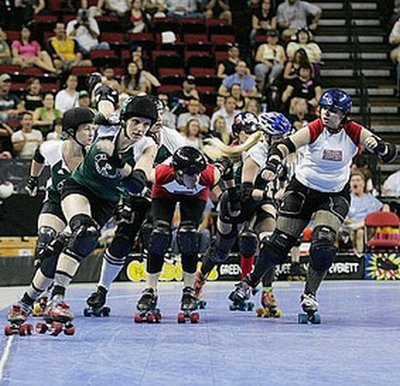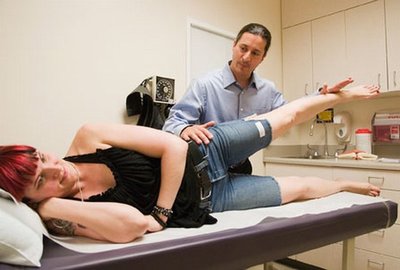July 9, 2009
UW back pain program provides relief, hope
Back pain affects an estimated 8 in 10 people, according to the National Institutes of Health. It also adds to rising health-care costs. Annual costs related to back pain may run as high as $100 billion per year.
For some people, back pain means a little twinge or a spasm that occurs after bending or twisting. But the expression, “Oh, my aching back,” has a different meaning for Seattle resident Britta Lyle. Nearly two years ago, Lyle fractured several bones in her spinal column in a roller derby match. Lyle is a former all-star player and current coach with Rat City Rollergirls, the Northwest’s first all-female roller derby league.
After the accident, she was on medications for a brief period to help ease the pain, started going regularly to rehabilitation, and returned to play roller derby in May 2008. Lyle was designated an alumna of the Rollergirls in November 2008 and turned to coaching as an injury-free way to participate.
Today, even without the intense activity, she continues to be plagued with back pain. To help determine what’s happening, Lyle went in June 2009 to the University of Washington’s Dr. Brian Krabak to get an update on her injury. Krabak, an associate professor in rehabilitation medicine, is part of a team of sports and spine physicians at UW.
“What’s going on today?” he asked, upon entering the exam room. Lyle ticked off several items, including: “I am not as active as I used to be when I was playing roller derby.” As it turns out, Krabak was at the bout in 2007 when Lyle was injured. He had just moved to Seattle from Baltimore, and some friends had suggested he check out the Rat City Rollergirls. (Krabak came to the UW from Johns Hopkins and also served as a team physician with the Baltimore Orioles.)
“I remember hearing somebody broke their back,” he said.
Krabak guided Lyle through a series of strength assessment activities, and probed more about the pain she’s currently feeling. “Where’s the pain — left side or right?” “Is it continuous or intermittent?” “Where does it fall on a scale from one to 10?” “What is worse—sitting, standing or bending forward?”
Doctor and patient came to a similar conclusion after the exam: Lyle backed off a bit from exercising once she was no longer playing roller derby, and she’d lost some strength that helped support her back.
“You’ve hit a plateau,” said Krabak. Lyle agreed. In the short-term, Krabak suggested Lyle continue to work on fitness goals, including core strength. Core equates with the body’s “core” or mid-section, and related strength is developed through yoga, pilates and even push-ups.
Lyle said, after meeting with Krabak, that she was reminded about the importance of setting goals, and not giving up. “No matter what your obstacles are, whether physical or mental, if you don’t set goals and work hard to reach them, it makes recovery very difficult,” she said. “I’ve seen the successful side of that and I am now going through the opposite. My goals as a coach do not include my own personal fitness, like they should.”
UW Medicine established in February 2009 an innovative back and musculoskeletal initiative that focuses on physical therapy and related conservative treatment instead of surgery. It’s meant to help patients like Lyle, and also those who are plagued with pain from a spine, knee or shoulder injury. Not everyone has to be a roller derby girl to experience back pain.
The program, a partnership between the UW Medicine Neighborhood Clinics and the UW Sports and Spine practice, is meant to increase access for patients, quality of care and efficiency, said Krabak. “Hopefully that translates into better outcomes for patients and we provide better care for our community,” he added.
The UW Medicine Neighborhood Clinics and UW’s Sports and Spine program have helpful health hints for patients on their web sites.
In addition, the U.S. Department of Health & Human Services has information on back pain, including how consumers may “take action” and protect their backs.
To learn more about the Rat City Rollergirls, visit http://www.ratcityrollergirls.com/.




